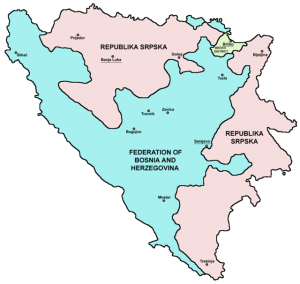In 1995, the Dayton Agreement was signed, putting to rest the three and a half long Bosnian War. As a result, the State of Bosnia Herzegovina was set as the Federation of Bosnia-Herzegovina (Federation), mostly Bosniak and Croat, and the Republika Sprksa (RS), mostly Serb. The Agreement envisioned a single country with a loose centralized system governing two entities. However, the Federation wishes for the state to be centralized and RS believe that they deserve independence, presumably to join Serbia.
Recently, evidence of the longstanding, fragmented relationship resurfaced. Milorad Dodik, a Bosnian Serb nationalist who advocates secession from Bosnia, led the race for president of the Serbian Republic of Bosnia, with 85 percent of ballots counted. Furthermore, regional elections follow suit as Bosnia Serb leaders pushed for independence, Bosnian Croat leaders pressed for more autonomy, and Bosnian Muslim leaders favored centralized power.
Is there a lack of accountability regarding the Agreement and its aftermath? The United States, alongside several global power, led the peace conference that gave way to the construction of the Agreement, effectively endorsing its spirit. But that spirit has seemingly abandoned the document and the country. For one, the original Dayton Agreement disappeared in 2008. In 2009, a certified copy took its place.
The conflict seems to be ethnically motivated: a portion of the population claims it does not belong to the country and claims it deserves to leave.
Does the international community have an obligation to mitigate what it effectively failed to facilitate? Bosnia is one of Europe’s poorest countries. Unemployment rate is at 44% and the country suffers from infrastructure deficiencies that are emblematic of the country’s crumbling stability.
Should the RS be granted independence to secede and join Serbia in an effort to resuscitate what’s left of the country? Why hasn’t RS garnered international attention as an independent state?
Sources: New York Times, Trans Conflict
